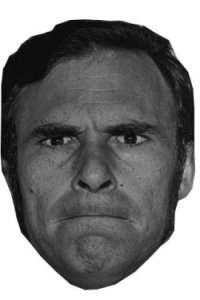Angry faces take priority in our brain

(PhysOrg.com) -- In any social situation, we need to be aware of threats to our own safety from other people. That may be why our brains are better attuned to remembering the identity of angry faces over short periods of time.
As well as discovering improved short term memory for angry faces, researchers at Bangor University's School of Psychology have located a key brain area that responds more actively to angry than happy or neutral faces. This discovery is being published in a scientific paper today by PLoS ONE (eISSN-1932-6203), an international, peer-reviewed, open-access, online publication, publishing reports on primary research from any scientific discipline.
"The fact that we have located the process taking place deep in the brain- in an area associated with primitive emotional response systems- suggests that the ability to retain angry faces in our short term memory is associated with our survival instincts," explains Dr Margaret Jackson, the paper's lead author.
She describes this finding as part of a 'threat superiority effect'. It implies that the signal from the newly identified area of activity boosts the brain processing for face identification- as a priority activity relevant to our safety.
"The ability to remember who is angry may have been of evolutionary importance in enabling us to respond to a threat situation. Remembering who's happy is less important as it bears no relation to our own immediate safety," explains Jackson.
Our ability to function in social situations relies crucially on our short term memory- for fluid and coherent conversation, and to remember what's happening and what we're doing in our immediate surroundings. The frontal lobe is generally the area involved in these short term memory processes.
"This research highlights a part of the brain in which abnormal activity has been implicated in several neuropsychiatric conditions including schizophrenia, and mood disturbances that can be observed in Parkinson's disease", commented Professor David Linden, a psychiatrist who collaborated on the project. "Patients suffering from these diseases are often impaired in their ability to use social cues in everyday communication".
This work falls into the rapidly expanding new field of social cognitive neuroscience, one of the specialisms of the Wolfson Centre for Clinical and Cognitive Neuroscience, part of Bangor University's renowned School of Psychology.
Citation: Neural Correlates of Enhanced Visual Short-Term Memory for Angry Faces: An fMRI Study, www.plosone.org/article/info:doi%2F10.1371%2Fjournal.pone.0003536;jsessionid=57B05D95FCFD08AA8C76632709EAB7D9
Provided by Bangor University





















